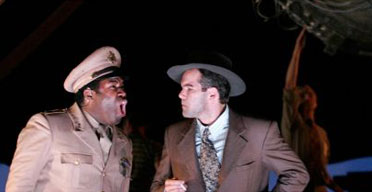
Doctor Atomic is John Adams's fifth work for the stage, though whether it's really an opera is a difficult question to answer. Certainly, the premiere - presented by the San Francisco Opera, which commissioned it - is fully staged, and involves a large chorus and a troupe of dancers as well as a cast of soloists and full orchestra. But in making a musical treatment of the events leading up to the detonation of the first atomic bomb in the New Mexico desert in June 1945, Adams and his librettist - Peter Sellars, who also directs the staging - seem to blur the distinction between opera and oratorio, between something designed for a theatre and a score intended for the concert hall.
Some scenes are authentically operatic: the exchanges between Robert Oppenheimer, leader of the Manhattan Project, and his colleagues about the likely consequences of the test; the insistence of the military that the test should go ahead despite warnings of bad weather; the depictions of Oppenheimer's home life. But they are intercut with sections in which characters step outside the action to meditate upon the morality of the whole project. In those, the dramatic thread is sometimes lost altogether.
Sellars has based his text on a range of sources - contemporary memoirs and histories, plus extracts from poems by Baudelaire and Donne, and from the Bhagavad Gita - but in doing so he makes the work less immediate and dramatically involving. Characters speak in metaphor and high-flown imagery, so the key relationships on which the piece depends are sketchily defined. Crucially, the character of Oppenheimer remains enigmatic. In Gerald Finley's superbly sung performance, he emerges as edgy and morally ambivalent, but never assertive enough to lead the project successfully. In his arguments with Richard Paul Fink's equally impressive Edward Teller - a man without doubts but possessing all the ruthlessness that Oppenheimer lacks - he comes out second best, and with his wife Kitty (Kristine Jepson), his lack of a moral dimension is quickly apparent.
Adams's music cannot supply everything that is missing, but it certainly tries. It lacks the long-range architecture of his earlier works, and sustains a high level of dissonance that suggests a constant sense of unease. But it contains some glorious set pieces, none better than the aria with which the first of the two acts ends, a setting of a Donne sonnet as fine as anything Adams has written in the past decade. However, the end of the opera - the moment of the bomb's detonation - is dramatically unconvincing. And the point of the work is uncertain, too: is it a protest against nuclear weapons, a more balanced weighing of the issues involved, or a dry documentary presentation of what actually happened?
Sellars's production lacks that certainty; it fills the stage with historically accurate detail, but never creates clinching imagery. Only the excellence of the musical performance remains, conducted with superb incisiveness by Donald Runnicles. Even that, however, can't cut through the verbal flabbiness that weighs the drama down.
· In rep until October 22. Box office: 001 415 864 3330.

